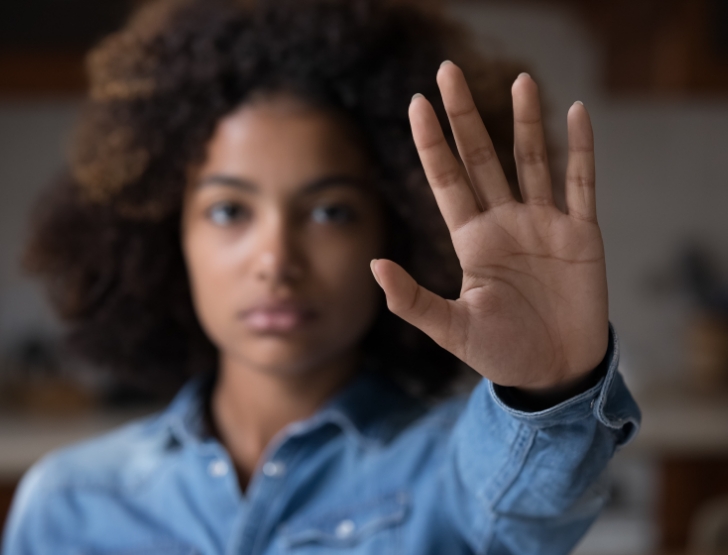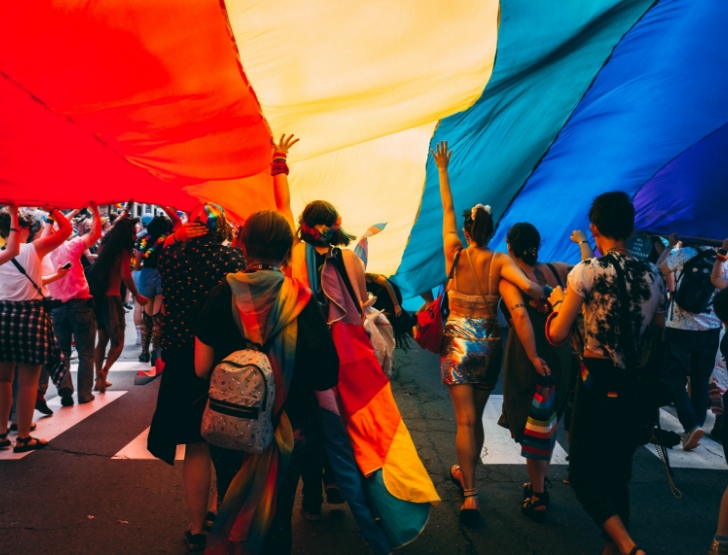
The Imprints Project is a support program for high school students committees to promote respect for diversity and fight all forms of discrimination and intimidation.
Guided by a committee facilitator from ENSEMBLE, the student committees identify a problem in their school, develop an action plan, and set up, throughout the year, awareness-raising and mobilizing activities for a positive transformation in their school. Imprints committees students thus serve as a lever by educating and supplying with tools the other students of their school, as well as by taking concrete actions to promote respect for diversity in all its forms.
These activities with strong mobilizing potential not only have a considerable impact on the environment of participating schools but also help foster student engagement and leadership and give more power to young people to create a more welcoming, safe, and inclusive school.
Imprints projects draw their strength from the fact that they are designed by and for young people; that is to say, they are initiated, developed, and executed by young people addressing their peers. This is how their influence is increased, they reach their target, and they succeed in positively impacting their school.
– Workshop to raise awareness (previously, Caravan of Tolerance): The interactive workshop invites young people to think critically about discrimination, prejudices and stereotypes according to the form they take and the different consequences they can have.
– Recruitment and information meetings: In each school, around ten students are recruited based on their motivation to get involved in a committee.
– Training camp: Students involved in the Imprints committees participate in a two-day training camp, which will train them on the different themes relating to diversity.
– Taking Action : Students elaborate in detail and implement the committee’s actions at their school. They will be able to use all their creativity and sense of innovation to inspire their peers.
– Big gathering: On this day of celebration, students look back on the activities organized during the year and share them with students from other schools.

4th to 6th grade, primary school
These three interactive workshops of 60 minutes aim to identify, prevent and counter bullying and violence in schools. They offer students the opportunity to express themselves by participating in games, scenarios and discussions on positive self-affirmation and empathy.
Before the workshops, an accompanying guide is distributed to teachers to introduce them to the three themes covered and to provide tools to explore the subject further.
Understanding, experimenting and learning to put positive self-affirmation into practice using different fun scenarios. Deepening the notions of self-respect and respect of others.
Understanding empathy and learning to put it into practice. Deepening the notions of differences and diversity.
Knowing how to recognize bullying in different contexts. Finding solutions to counter the issue and understanding the power of witnesses. Understanding the importance of denouncing and intervening. Encouraging people to put into practice the knowledge and techniques learned in previous workshops in order to fight bullying.

4th-6th, primary school
This interactive workshop invites students to acknowledge, respect and value their differences as well as encourage empathetic reactions to diversity. Students have the opportunity to learn and express themselves on issues related to difference while participating in activities.
Facilitators first tell a fun life story to open the discussion about differences and identity construction. Students are then led to identify the differences that exist between people.
Subsequently, each student completes an ID card by writing down fun informations such as their passions, strengths or even what makes them unique. Facilitators use this activity to encourage student reflection and highlight the value of each identity. The workshop continues with a discussion on the advantages and obstacles related to differences. The notion of empathy is brought up to emphasize its importance in the face of what we judge to be “different”.
To put the workshop’s content into practice, students participate in a game which allows them to note similarities which unite them and their differences which distinguish them since it is important to see these as strengths rather than weaknesses.

6th, primary school to 2nd, high school
The workshop Violence and Bullying in Schools is a unique awareness-raising activity on the issue of violence and bullying in school.
By creating a space where youth can express themselves frankly, the workshop aims to supply them with tools and mobilize them to oppose violent words and actions that may occur in their environment.
To achieve this, facilitators address the concepts of labels, empathy, active witness and social norms through discussion and different fun activities.
Students are invited to think about the phenomenon of social violence targeting individuals from marginalized communities as well as the ideas behind this type of behaviour. Facilitators invite them to acknowledge and question some of their environment social norms contributing to violence against others.

1st cycle, high school
The workshop Cultural Diversity and Living Together is a unique awareness-raising activity on the issue of coexistence in a pluralistic and multicultural society.
By creating a space where youth can express themselves frankly, the workshop aims to supply them with the tools to question hateful speech and denounce xenophobia, of which some communities are sometimes victims in Quebec and Canada.
To achieve this, facilitators address the concepts of culture, xenophobia, identity and stereotypes through different fun activities. The workshop also provides a brief overview of the history of discriminatory laws in Canada to give students a historical perception of the issues addressed. Finally, the workshop discusses with students the role of media and its influence on the perception that our society sometimes has of some groups of people. With the activity “The Line”, participants are invited to overcome initial prejudices and engage in dialogue with groups from cultural diversity.

1st cycle, high school
The workshop Cyberviolence and Online Life is a unique awareness-raising activity on the issue of online violence and bullying.
By creating a space where youth can express themselves frankly, the workshop aims to supply them with tools and mobilize them to oppose various violent behaviours they may witness online and question some of their own attitudes.
To achieve this, facilitators address the concepts of empathy, social violence, social norms and moral disengagement through discussion and different fun activities.
The workshop focuses on deconstructing certain myths associated with the phenomenon of cyberbullying and address head-on themes such as body image, sexism, online harassment, homophobia and marginalized communities.

1st-5th, high school
This workshop invites students to question Canadian history and collective memory, the way they are constructed, presented and taught in our societies with regard to black communities in Quebec and Canada.
Through interactive activities and videos, students are introduced to the history of black people and their contributions to different sectors of our societies to become aware of the persistence of racism and its different forms of manifestation over the years, and to get tools and organize themselves to fight against discrimination against black communities and all other communities that may be victims of it.
After the workshop, an educational kit is sent to teachers to present informations related to diversity, equality and discrimination and provide tools to address these concepts in classes.

2nd-5th, high school
The interactive workshop on discrimination invites students to think critically about the causes and manifestations of different forms of oppression, particularly racism, sexism, homophobia and transphobia, to create a more equal and inclusive environment.
After defining the different forms of oppression, facilitators offer an interactive activity to illustrate power inequalities between majority and minority groups, understand the notions of “privilege” (white, straight, male, cisgender) and oppression, and also highlight the role of major human rights movements (anti-racism, LGBTQ+, feminism).
Students are invited to put themselves in other people’s shoes and think about everyday situations that may affect them in order to find ways to fight prejudice, discrimination and inequality.

2nd-5th, high school
The workshop on sexism invites students to think critically about issues related to gender and sexism to create a more equal and inclusive environment.
After differentiating certain key notions (sex assigned at birth, gender identity and expression) and painting a picture of the inequalities between genders in Quebec, facilitators explore the causes and manifestations of sexism, particularly in terms of stereotypes, gender norms and double standards.
Through discussions and interactive activities, facilitators then address the sensitive issue of sexual violence in order to deconstruct the many myths that perpetuate rape culture and to help students recognize situations of sexual harassment and understand the concept of consent. Finally, we present an overview of feminist movements and suggest some means of action to fight sexism and promote gender equality.

2nd-5th, high school
The interactive workshop on sexual and gender diversity, LGBTQphobia and LGBTQ+ rights invites students to think critically about cisheteronormativity and LGBTQphobia in order to create a more welcoming and inclusive school environment.
First, facilitators define key concepts related to sexual and gender identity and display the diversity within these categories. We then explore the systems of oppression that affect LGBTQ+ communities today, and facilitators help students to acknowledge both the causes and concrete manifestations of these phenomena in their environment.
Finally, the last part of the workshop provides a historical overview of the various struggles for LGBTQ+ rights. Various solutions are also proposed to promote the creation of a school/society welcoming sexual and gender diversity.

2nd-5th, secondary school
The interactive workshop on racism invites students to think critically about issues related to racism to create a more egalitarian, inclusive and welcoming environment for everyone.
Facilitators offer interactive activities to help students recognize the forms and manifestations of racism, as much in terms of ideas (stereotypes, prejudices), attitudes, individual behaviours (racial profiling, microaggressions, discrimination, hate crimes), as well as social norms and structures (“white privilege”).
The different examples mentioned, taken from history and current events, allow us to understand the mechanics common to all forms of racism without neglecting its specificities and variations (anti-black, Islamophobia, anti-Semitism, anti-Asian, etc.). Students are also invited to identify anti-racist solutions, both individual and collective, to reduce inequalities between the majority and racialized minorities.

In a constantly evolving professional world, we believe in the positive impacts of awareness to promote respect for differences and encourage accessible, open and caring dialogue. Our goal is to build environments free of discrimination and bullying. Our training aims to make individuals aware of their responsibility in the face of various forms of discrimination, whether racism, sexism, ableism, homophobia, transphobia, bullying or others.
To book your training and discuss your specific needs, do not hesitate to contact our team today!
